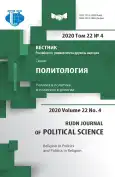Nation and Religion: towards Definition of Religious Nationalism
- Authors: Sitnikov A.V.1
-
Affiliations:
- The Russian Presidential Academy of National Economy and Public Administration
- Issue: Vol 22, No 4 (2020): RELIGION IN POLITICS AND POLITICS IN RELIGION
- Pages: 579-589
- Section: RELIGION, NATION, IDENTITY: POLITICAL MEANINGS IN THE MODERN WORLD
- URL: https://journal-vniispk.ru/2313-1438/article/view/322183
- DOI: https://doi.org/10.22363/2313-1438-2020-22-4-579-589
- ID: 322183
Cite item
Full Text
Abstract
The aim of the article is to study the phenomenon of religious nationalism, i.e. cases when religion and nationalism are closely related and reinforce each other, and religious identity becomes an important and integral part of national identity. The author aims to analyze the political context of cases of religious nationalism in European countries, to describe their essential features and conditions of occurrence, and also to answer the question: are there any political reasons for religious nationalism? Considering the phenomenon of nationalism in the framework of the constructivist approach, the author also employs the methods of comparative analysis, using material from such countries as Ireland, Poland, Greece, the countries of the former Yugoslavia, as well as the Russian case taking place in the Chechen Republic. Summarizing these cases, the author describes the conditions for the emergence of an “alliance” of religion and nationalism. Firstly, it is a religious difference between neighboring communities. Secondly, it is a conflict between them, which contains a threat to identity. In these cases, religion becomes an important marker that distinguishes communities from each other, and begins to perform non-religious functions: the affirmation of national identity, ethnic pride, national honor, protection of sovereignty, and culture. Religious nationalism always stimulates growth of religious commitment of a nation, in which the number of believers may reach 90 percent. But this commitment is not individual, it is not based on a personal choice of faith, but collective and obligatory. Religious affiliation is dictated by loyalty to the nation.
About the authors
Alexey V. Sitnikov
The Russian Presidential Academy of National Economy and Public Administration
Author for correspondence.
Email: sitnikov-av@ranepa.ru
Doctor of Philosophical Sciences, Professor of the Department of State-Confessional Relations
84, Prospekt Vernadskogo, Moscow, 119571, Russian FederationReferences
- Kinnvall C. Globalization and Religious Nationalism in India. The search for ontological security. New York; 2006.
- Veer P. Religious Nationalism: Hindus and Muslims in India. Berkeley: University of California Press; 1994.
- Biver E. Religious nationalism: Myanmar and the role of Buddhism in anti-Muslim narratives. Lund University; 2014.
- Barker P. Religious Nationalism in Modern Europe: If God be for Us. London: Routledge; 2009.
- Anderson B. Imagined Communities. Reflection on the Origin and Spread of Nationalism. London, New York; 1991.
- Yack B. Nationalism and the Moral Psychology of Community. University of Chicago Press; 2012.
- Mann M. The Sources of Social Power. Vol. 2. The Rise of Classes and Nation States 1760–1914. Cambridge University Press; 1993.
- Greenfeld L. Nationalism: Five Roads to Modernity. Harvard University Press; 1992.
- Delanty G. and O’Mahony P. Nationalism and Social Theory. Modernity and the Recalcitrance of the Nation. London: SAGE Publications; 2002.
- Le Goff J. The Birth of Europe. St. Petersburg.: Alexandria; 2014 (In Russ.).
- Dingley J. Nationalism, Social Theory and Durkheim. New York, Palgrave Macmillan; 2008.
- Amalvi Ch. Catholicisme et Nationalisme les Métamorphoses Nationalistes de Jeanne d’Arc, de la troisième à la quatrième République: 1870–1946. In: Confessiones et Nationes. Discours identitaires nationaux dans les cultures chrétiennes: Moyen Âge – XXe siècle. Paris: Honoré Champion Éditeur; 2014. p. 265–280 (In French).
- Nelson B. Irish Nationalists and the Making of the Irish Race. Princeton, NJ: Princeton University Press; 2012.
- Coakley John. The Religious Roots of Irish Nationalism. Social Compass. 2012; 58 (1): 95–114.
- Lawrence J. McCaffrey. Irish Nationalism and Irish Catholicism: A Study in Cultural Identity.Church History. 1973; 42 (4): 524–534.
- Jenkins B. Irish Nationalism and the British State: From Repeal to Revolutionary Nationalism. McGill-Queen’s Press – MQUP; 2014.
- Zubrzycki G. Polonia semper fidelis? National Mythology, Religion and Politics in Poland. Gosudarstvo, religiia, tserkov’ v Rossii i za rubezhom. 2016; 34 (3): 44–78. htps://doi.org/ 10.22394/2073-7203-2016-34-3-44-78 (In Russ.).
- Gryz R. Catholic Church in the People’s Republic of Poland (1944/45–1989): Forms of Co-Existence with the Regime and the Role of Ideological Opposition. Gosudarstvo, religiia, tserkov’ v Rossii i za rubezhom. 2016; 3: 11–43. https://doi.org/10.22394/2073-7203-2016-34-3-11-43 (In Russ.).
- Volobuev V.V. Political opposition in Poland 1956–1976. Moscow: Institut slavjanovedenija RAN; 2009 (In Russ.).
- Petrunina O.E. The Greek nation and state in the XVIII–XX centuries. Essays on Political Development. Moscow: KDU; 2010 (In Russ.).
- Mavrogordatos G. Orthodoxy and nationalism in the Greek case. West European Politics. 2010; 26 (1): 117–136.
- Georgiadou V. Greek Orthodoxy and the Politics of Nationalism. International Journal of Politics, Culture, and Society. 1995; 9 (2): 295–315.
- Chrysoloras N. Why Orthodoxy? Religion and Nationalism in Greek Political Culture. Studies in Ethnicity and Nationalism. 2008; 4: 40–61.
- Venizelos E. Relations between the state and the church: a view through the prism of the constitution. Moscow: Novoe izdatel’stvo; 2008 (In Russ.).
- Safran W. (ed.) The Secular and the Sacred: Nation, Religion and Politics. London: Frank Cass; 2005.
- Horowitz D. Ethnic Groups in Conflict. Berkeley: University of California Press; 1985.
- Lieven A. Chechnya: Tombstone of Russian Power. Yale University Press; 1999.
- Sitnikov A.V., Romanov M.V., Odaev T.H. Religiousness in the Chechen Republic and its influence on social institutions and institutions of power. Monitoring obshhestvennogo mnenija: Jekonomicheskie i social’nye peremeny. 2019; 2: 157–183. URL: https://doi.org/ 10.14515/monitoring.2019.2.08. Accessed: 03.08.2020 (In Russ.).
Supplementary files









